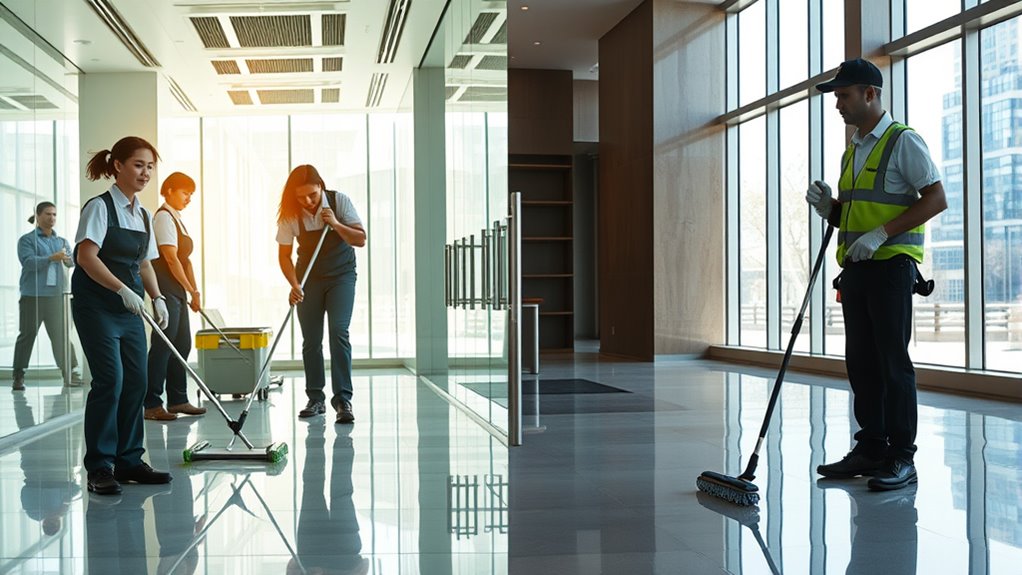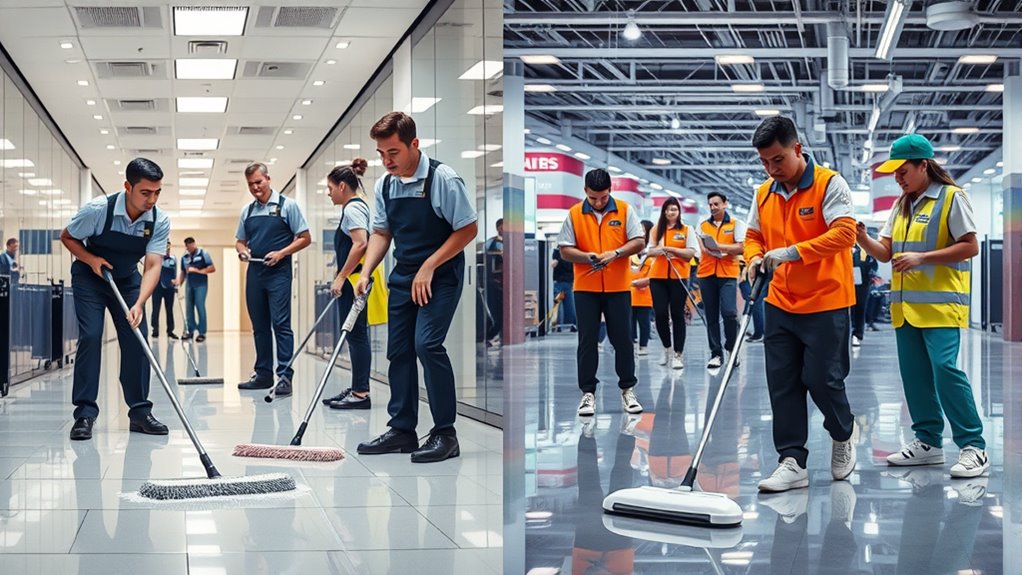When choosing between hiring in-house cleaning teams and outsourcing services, you’ll want to evaluate costs and management complexities. In-house teams may provide direct oversight and personal attention but come with hidden expenses, high turnover, and ongoing training needs. Outsourced cleaning offers predictable fees, flexibility, and access to trained professionals who maintain quality standards. Both options have their pros and cons, and understanding these will help inform your decision on the best cleaning solution for your business needs. More insights await you!
Key Takeaways
- Conduct a thorough cost analysis comparing in-house cleaning expenses with outsourced services, factoring in hidden costs like turnover and supplies.
- Evaluate the quality assurance programs of potential cleaning companies to ensure they meet industry standards and maintain high cleanliness levels.
- Consider the flexibility of outsourced cleaning services, which can quickly adjust to changing operational needs and schedules without extensive administrative burdens.
- Assess the benefits of direct oversight with in-house teams for personalized attention, but balance it against the potential for high turnover and management complexities.
- Prioritize regular communication with cleaning providers to identify unforeseen expenses and maintain transparency in service quality and responsiveness.
Understanding In-House Cleaning Costs

When considering in-house cleaning, it’s essential to grasp the true costs involved. An in-house cleaning team may seem convenient, but the expenses quickly add up. Salaries average over $4,000 per staff member, and training expenses typically hit around $1,111 for each new hire.
You’ll also need to factor in employee benefits and insurance coverage, which can strain your operational budgets. Additionally, the responsibility for cleaning supplies and equipment falls on you, leading to potential hidden costs if not managed properly.
High turnover rates in the janitorial sector mean you’ll face ongoing hiring and onboarding efforts, further increasing your labor costs. Understanding these factors is vital for making informed decisions about your cleaning strategy. Moreover, establishing clear savings goals can help manage the financial impact of these expenses effectively.
Evaluating Outsourced Cleaning Expenses

When evaluating outsourced cleaning expenses, you’ll want to conduct a cost comparison analysis between in-house and contracted services.
Keep an eye out for hidden expenses that can crop up with in-house teams, like turnover and absenteeism. Understanding these factors can help you make a more informed choice that aligns with your budget and operational needs.
Cost Comparison Analysis
Evaluating the cost implications of outsourced cleaning services can reveal significant savings for your business. By comparing the expenses of an in-house team versus commercial cleaning companies, you’ll find that outsourced cleaning often reduces overall costs. Here’s a quick comparison:
| Expense Type | In-House Team | Outsourced Cleaning |
|---|---|---|
| Salaries & Benefits | $4,000+ per staff | Included in fees |
| Training Costs | $1,111 annually | Not applicable |
| Equipment & Supplies | Upfront investment | Included in contract |
Hidden Expenses Awareness
Understanding the hidden expenses associated with outsourced cleaning services can greatly impact your bottom line. While outsourced commercial cleaning can offer predictable expenses through contractual agreements, it’s vital to be aware of hidden costs.
Many contracts include supplies and equipment, reducing upfront expenses you’d face with in-house cleaning. However, long-term savings hinge on avoiding costs related to employee turnover and management.
To protect your cleaning budget, thoroughly review service level agreements (SLAs) to uncover potential additional fees for extra services or supplies. Regular communication and performance assessments with your cleaning provider can help identify unforeseen expenses, ensuring transparency and keeping your costs manageable.
Direct Cost Comparison: In-House vs. Outsourced

While you’re weighing your options for commercial cleaning, it’s essential to take into account the direct costs associated with in-house versus outsourced services.
Here are some key points to reflect upon:
- In-House Cleaning Staff Costs: You’ll face salaries, benefits, training expenses averaging $1,111 per new employee, and ongoing supply costs, exceeding $4,000 per employee.
- Outsourced Cleaning Services: Typically, these come with predictable contractual fees, eliminating direct costs like employee benefits and training.
- Supplies and Equipment: In-house cleaning requires hefty expenditures for supplies and maintenance, while commercial cleaning companies often include these in their contracts.
Indirect Costs and Management Considerations

When you manage an in-house cleaning team, time becomes a critical factor as you juggle hiring, training, and overseeing staff.
This effort not only adds to your workload but also introduces liability and insurance complexities that can strain your budget.
Understanding these indirect costs is essential for making informed decisions about your cleaning strategy.
Time Management Implications
Managing your cleaning staff in-house can consume a significant amount of time and resources, diverting your focus from core business activities. Here are some time management implications to reflect on:
- Hiring Costs: The average cost exceeds $4,000 per new employee, plus $1,111 annually for training, which can strain your budget and time.
- Turnover Challenges: High turnover in janitorial services means you’ll spend more time on hiring and onboarding, disrupting your cleaning schedules.
- Outsourced Efficiency: Partnering with cleaning companies allows you to focus on maintaining a clean environment without the administrative burden of managing staff.
Liability and Insurance Risks
Engaging in-house cleaning staff can expose your business to significant liability and insurance risks, which may not be immediately obvious.
You’ll need to carry general liability and workers’ compensation insurance, driving up operational costs. By outsourcing your cleaning to a professional cleaning company, you can shift that liability onto them, reducing your insurance premiums and overall exposure.
Plus, managing in-house cleaners means ensuring compliance with OSHA regulations, adding more complexity to your operations. The potential for accidents and injuries can lead to increased insurance claims, impacting your financial stability.
Outsourcing provides peace of mind, allowing you to focus on core business activities without the burden of managing liability concerns associated with your cleaning staff.
Benefits of Maintaining an In-House Cleaning Team

While many businesses consider outsourcing cleaning services, maintaining an in-house cleaning team offers distinct advantages that can greatly enhance your operations.
Here are three key benefits:
- Control Over Cleaning Operations: You’ll have direct oversight of schedules, quality standards, and specific cleaning needs, ensuring consistency and satisfaction.
- Stronger Employee Morale: A dedicated team familiar with your facility fosters cohesion and commitment, leading to a more positive workplace environment.
- Personalized Attention: Your in-house team can focus on areas that require extra care, enhancing cleanliness and hygiene across the board. Additionally, having an in-house team allows for more effective communication with management regarding specific cleaning protocols and adjustments.
Investing in an in-house cleaning team may come with hiring and training costs, but the return in employee morale and a well-maintained environment can greatly boost productivity.
Advantages of Choosing Outsourced Cleaning Services

When you choose outsourced cleaning services, you can enjoy significant cost savings while ensuring high quality standards.
You won’t have to worry about expenses like salaries or equipment, as these companies bring their own resources and expertise.
Plus, their flexible services can be tailored to fit your specific needs, allowing you to focus on what matters most—your core business.
Cost Efficiency Benefits
Outsourcing your cleaning services not only streamlines your operations but also leads to considerable cost savings. By choosing reliable cleaning companies, you can enjoy several cost efficiency benefits:
- Reduced Expenses: Avoid the high costs of salaries, benefits, and training, which can exceed $4,000 per hired staff member.
- No Supply Costs: Many cleaning companies provide their own supplies and professional equipment, saving you from investing in expensive materials.
- Flexible Pricing: Outsourced services offer tailored cleaning plans that fit your budget, ensuring predictable expenses without hidden costs.
Additionally, by outsourcing, you’ll considerably decrease administrative burdens, allowing you to focus on core operations and boost overall efficiency. This approach aligns with strategies used in efficient e-commerce credit card processing, which emphasize cost savings and streamlined operations.
Embrace outsourcing for a smarter, cost-effective cleaning solution.
Quality Assurance Standards
Choosing to outsource your cleaning services brings more than just cost efficiency; it also elevates the quality of cleanliness in your facility.
With outsourced services, you benefit from trained professionals who adhere to industry cleaning standards, often surpassing in-house performance. Many commercial cleaning companies implement robust quality assurance programs, guaranteeing consistent quality through regular inspections and feedback. This ensures that real-time monitoring capabilities are utilized to promptly address any cleaning deficiencies. Additionally, these professionals utilize advanced tools and techniques to provide effective repairs to any cleaning challenges encountered.
Their use of specialized cleaning equipment and techniques enhances effectiveness, contributing to a healthier workplace. Additionally, outsourced providers are well-versed in the latest hygiene protocols and compliance standards, mitigating the risk of inadequate cleaning.
Plus, they often guarantee their work quality, leading to faster resolutions for any cleaning issues that arise. This commitment guarantees a consistent, high-quality clean for your business. Furthermore, outsourcing cleaning services allows you to focus on core business functions, enabling your team to concentrate on essential tasks without distraction.
Assessing Quality and Consistency in Cleaning

While you might consider various factors in your decision-making process, evaluating the quality and consistency of cleaning services is essential.
Here are three key aspects to focus on:
- Quality Assurance Programs: Look for outsourced cleaning services that implement regular inspections and gather customer feedback to guarantee high-quality results.
- Training and Standards: In-house cleaning can vary in quality based on staff training and management. Ensure your team receives ongoing training and adheres to specific cleaning standards.
- Consistency: Outsourced cleaning companies are trained professionals who maintain a consistent level of cleanliness, adapting to your needs without compromising quality.
Flexibility and Scalability in Cleaning Solutions

When it comes to managing cleaning solutions, flexibility and scalability can greatly impact your operational efficiency. Outsourced cleaning services allow you to easily adjust cleaning schedules based on seasonal demands or occupancy changes. Unlike in-house teams, outsourced providers can quickly scale their services, adding staff during peak times or reducing them when things slow down. This adaptability helps you meet your operational needs without the hassle of hiring and layoffs.
Here’s a quick comparison:
| Aspect | Outsourced Cleaning |
|---|---|
| Flexibility | High |
| Scalability | Quick adjustments possible |
| Customization | Tailored cleaning schedules |
| Administrative Burden | Minimal |
| Responsiveness | Fast to adapt |
Embracing outsourced cleaning can enhance your overall efficiency.
Selecting the Right Commercial Cleaning Company

How can you guarantee that you select the right commercial cleaning company?
Start by evaluating potential cleaning companies based on their track record and industry certifications, which show their commitment to high standards.
Next, request detailed service proposals that clearly outline the scope of work, frequency of cleaning, and the cost associated with their services.
Finally, make certain they offer customized solutions tailored to your specific needs.
Here are three key factors to take into account:
- Customer Reviews: Look for testimonials that highlight reliability and satisfaction.
- Insurance Coverage: Make sure they provide thorough liability and workers’ compensation insurance.
- Flexibility: Choose a company that can adapt to changes in your cleaning requirements.
This approach sets you up for success!
Making an Informed Decision for Your Business

Making an informed decision about your business’s cleaning needs involves weighing several critical factors. First, conduct a cost-benefit analysis to evaluate the total expenses of in-house versus outsourced commercial cleaning. In-house cleaning can exceed $4,000 per staff member, while outsourcing offers predictable fees without hidden costs. Remember, managing an in-house team requires ongoing oversight, which can distract from your core operations. Additionally, having a clear understanding of the tax implications of your cleaning budget can help in making a financially sound decision. Moreover, regular checks on credit card statements can aid in tracking expenses related to cleaning services and ensure you stay within budget. It’s also important to recognize that advance directives about cleaning contracts can guide decision-making when you are unable to manage these tasks personally.
In contrast, specialized cleaning companies provide trained staff and quality control programs that adhere to industry standards. Flexibility is another key point; outsourced services can easily adjust to seasonal demands, while in-house teams often face hiring or layoffs. Additionally, exploring the role of forensic financial investigators can help uncover any hidden costs associated with in-house cleaning operations.
Ultimately, consider what best suits your business’s unique needs and resources.
Frequently Asked Questions
What Are the Advantages of Outsourcing Cleaning Services?
Outsourcing cleaning services offers you significant advantages.
You’ll save money by avoiding hiring and training costs while benefiting from professional expertise.
The flexibility allows you to adjust cleaning schedules based on your needs without the hassle of managing staff.
Plus, the responsibility for supplies and equipment shifts to the cleaning provider, reducing your overhead.
What Business Structure Is Best for a Cleaning Company?
When you’re starting a cleaning company, choosing the right business structure is essential.
An LLC is often your best bet since it provides personal liability protection and flexible taxation.
If you prefer simplicity and lower costs, a sole proprietorship might work, but keep in mind the personal liability it carries.
Weigh your long-term goals and operational needs carefully to determine the structure that fits your vision and safeguards your interests.
What Is the Best Way to Get Cleaning Contracts?
To get cleaning contracts, start by targeting industries that have high cleaning needs, like healthcare and corporate offices.
Create a detailed proposal showcasing your services and competitive pricing.
List your business on online platforms to increase visibility and attract clients.
Networking is key—attend local events and trade shows to build connections and gain referrals.
Finally, consider offering trial services to showcase your quality and establish trust with potential clients.
How Much Should I Charge for 2 Hours of Cleaning?
When determining how much to charge for two hours of cleaning, consider your services and the market rates.
Typically, you’d charge between $50 to $100 for standard cleaning. If you’re offering specialized services, like deep cleaning, you might want to increase that to $75 to $150.
Don’t forget to factor in your overhead costs and think about flexible pricing options to attract more clients. This way, you’ll stay competitive in the market.
Conclusion
In the end, whether you hire a cleaning team or outsource, it’s clear: you’re either paying for someone to scrub your floors or for a service that scrubs your floors while you try to figure out who’s really got the better deal. Isn’t it ironic? Both options have their perks and pitfalls. You might save a few bucks with outsourcing, but then again, nothing beats the comfort of knowing your in-house team is just a shout away.










